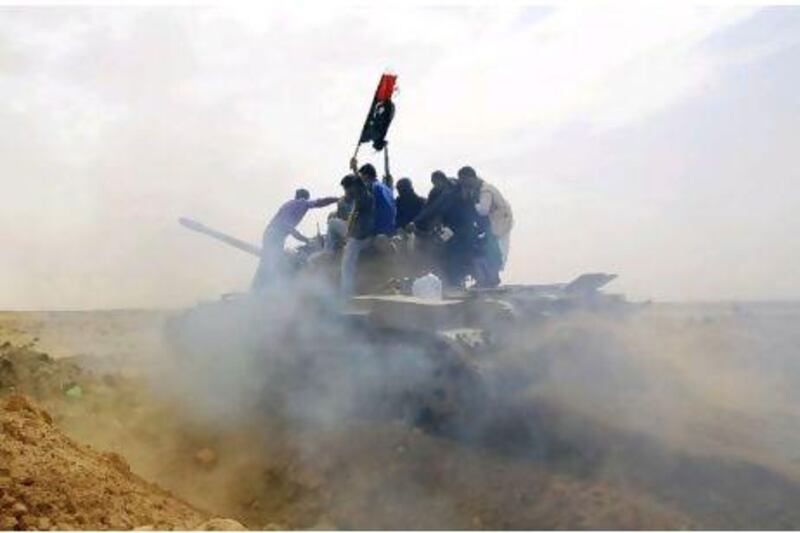BREGA // A protracted war for Libya appeared increasingly likely yesterday as rebels and forces loyal to Muammar Qaddafi fought a 12-hour, see-saw battle for control of this strategic eastern city.
As night fell, the rebels, equipped with AK-47s and rocket-propelled grenades, had succeeded in turning back attempts by the pro-Qaddafi forces to retake the city with tanks, artillery barrages and air strikes by Mirage warplanes.
The anti-Qaddafi militias were aided by reinforcements who rushed to the city from Benghazi and other nearby communities as fighting raged throughout the day around an oil terminal, the university and the airport. At least four people were killed and 20 wounded in the clashes, according to doctors at a local hospital.
In a reflection of the equally ferocious psychological and propaganda war that pro- and anti-government forces are fighting, Libyan state television said late yesterday that Qaddafi forces still controlled Brega's airport and seaport.
While at least temporarily victorious in the battle for Brega, the rebels appeared badly outgunned, especially from the air. "We are probably going to call for foreign help, probably air strikes at strategic locations that will finally put the nail in Qaddafi's coffin," said Mustafa Gheriani, a spokesman for the rebel February 17th Coalition.
Fifty kilometres away in Ajdabiya, there were signs that the insurgents were poorly organised and trained too. Boxes of ammunition were scattered on the desert floor, and French anti-tank rockets, Russian anti-aircraft missiles, rocket-propelled grenades and Katyusha rockets were haphazardly piled in a decrepit armoury.
Nigel Collins, a former British paratrooper, said as he inspected ammunition boxes: "This is good stuff. It's worth millions and millions of dollars."
Some of the weapon systems are decades old, but they "would work if you put it in the hands of someone who knows how to use it", said Mr Collins, who provides security for a Canadian news organisation.
Across eastern Libya, militias were hastily being formed and training sessions were under way to ensure that those willing to fight Colonel Qaddafi's regime have the skills to do so.
Most Libyan men are required to serve at least six months in the army, so "most of the youth here know how to shoot a gun", said Captain Fares Azweiya, who has just started training rebel recruits in Ajdabiya.
Hassan Fattiah, 22, one of the recruits, said: "We learn how to fire RPGs, how to use tanks and how to handle live ammunition."





